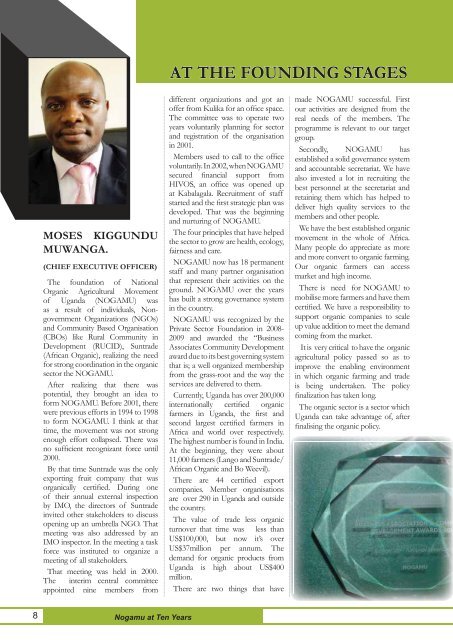Newsletter issue 33 - Nogamu
Newsletter issue 33 - Nogamu
Newsletter issue 33 - Nogamu
Create successful ePaper yourself
Turn your PDF publications into a flip-book with our unique Google optimized e-Paper software.
AT THE FOUNDING STAGES<br />
MOSES KIGGUNDU<br />
MUWANGA.<br />
(CHIEF EXECUTIVE OFFICER)<br />
The foundation of National<br />
Organic Agricultural Movement<br />
of Uganda (NOGAMU) was<br />
as a result of individuals, Nongovernment<br />
Organizations (NGOs)<br />
and Community Based Organisation<br />
(CBOs) like Rural Community in<br />
Development (RUCID), Suntrade<br />
(African Organic), realizing the need<br />
for strong coordination in the organic<br />
sector the NOGAMU.<br />
After realizing that there was<br />
potential, they brought an idea to<br />
form NOGAMU. Before 2001, there<br />
were previous efforts in 1994 to 1998<br />
to form NOGAMU. I think at that<br />
time, the movement was not strong<br />
enough effort collapsed. There was<br />
no sufficient recognizant force until<br />
2000.<br />
By that time Suntrade was the only<br />
exporting fruit company that was<br />
organically certified. During one<br />
of their annual external inspection<br />
by IMO, the directors of Suntrade<br />
invited other stakeholders to discuss<br />
opening up an umbrella NGO. That<br />
meeting was also addressed by an<br />
IMO inspector. In the meeting a task<br />
force was instituted to organize a<br />
meeting of all stakeholders.<br />
That meeting was held in 2000.<br />
The interim central committee<br />
appointed nine members from<br />
different organizations and got an<br />
offer from Kulika for an office space.<br />
The committee was to operate two<br />
years voluntarily planning for sector<br />
and registration of the organisation<br />
in 2001.<br />
Members used to call to the office<br />
voluntarily. In 2002, when NOGAMU<br />
secured financial support from<br />
HIVOS, an office was opened up<br />
at Kabalagala. Recruitment of staff<br />
started and the first strategic plan was<br />
developed. That was the beginning<br />
and nurturing of NOGAMU.<br />
The four principles that have helped<br />
the sector to grow are health, ecology,<br />
fairness and care.<br />
NOGAMU now has 18 permanent<br />
staff and many partner organisation<br />
that represent their activities on the<br />
ground. NOGAMU over the years<br />
has built a strong governance system<br />
in the country.<br />
NOGAMU was recognized by the<br />
Private Sector Foundation in 2008-<br />
2009 and awarded the “Business<br />
Associates Community Development<br />
award due to its best governing system<br />
that is; a well organized membership<br />
from the grass-root and the way the<br />
services are delivered to them.<br />
Currently, Uganda has over 200,000<br />
internationally certified organic<br />
farmers in Uganda, the first and<br />
second largest certified farmers in<br />
Africa and world over respectively.<br />
The highest number is found in India.<br />
At the beginning, they were about<br />
11,000 farmers (Lango and Suntrade/<br />
African Organic and Bo Weevil).<br />
There are 44 certified export<br />
companies. Member organisations<br />
are over 290 in Uganda and outside<br />
the country.<br />
The value of trade less organic<br />
turnover that time was less than<br />
US$100,000, but now it’s over<br />
US$37million per annum. The<br />
demand for organic products from<br />
Uganda is high about US$400<br />
million.<br />
There are two things that have<br />
made NOGAMU successful. First<br />
our activities are designed from the<br />
real needs of the members. The<br />
programme is relevant to our target<br />
group.<br />
Secondly, NOGAMU has<br />
established a solid governance system<br />
and accountable secretariat. We have<br />
also invested a lot in recruiting the<br />
best personnel at the secretariat and<br />
retaining them which has helped to<br />
deliver high quality services to the<br />
members and other people.<br />
We have the best established organic<br />
movement in the whole of Africa.<br />
Many people do appreciate as more<br />
and more convert to organic farming.<br />
Our organic farmers can access<br />
market and high income.<br />
There is need for NOGAMU to<br />
mobilise more farmers and have them<br />
certified. We have a responsibility to<br />
support organic companies to scale<br />
up value addition to meet the demand<br />
coming from the market.<br />
It is very critical to have the organic<br />
agricultural policy passed so as to<br />
improve the enabling environment<br />
in which organic farming and trade<br />
is being undertaken. The policy<br />
finalization has taken long.<br />
The organic sector is a sector which<br />
Uganda can take advantage of, after<br />
finalising the organic policy.<br />
8 <strong>Nogamu</strong> at Ten Years


